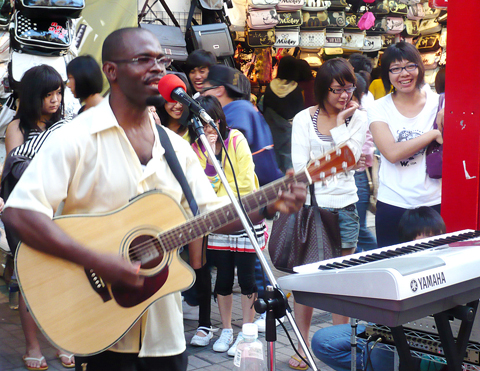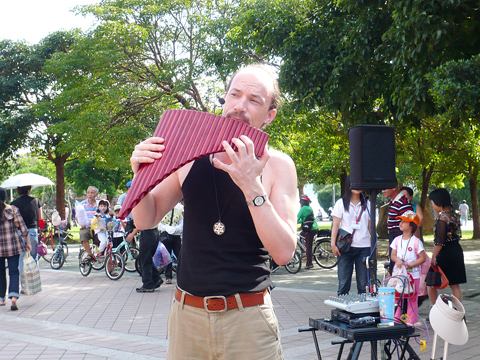Every Saturday and Sunday morning, Canadian pan flute artist Bernier Sylvain drives to Tamsui MRT Station and waits for the draw with other street artists to secure a performance spot at the rear of the station.
If he is lucky enough to get a spot, Sylvain starts setting up speakers, tuning devices, a small table displaying his printed CDs and a donation box, and begins his four to five-hour pan flute performance in the afternoon.

PHOTO: MO YAN-CHIH, TAIPEI TIMES
Sylvain’s soft and unique pan flute music always attracts the crowd’s attention.
Some commuters have even become fans and come to listen to his music regularly.
“People enjoy my music … And I like performing here [in Tamsui, 淡水] because everyone is happy to hear me play,” he said.

PHOTO: MO YAN-CHIH, TAIPEI TIMES
Sylvain, whose career as a full-time street artist began at a subway station in Montreal when he was 15 years old, traveled to Taiwan four years ago with his Taiwanese wife and became one of five certified foreign street artists in Taipei City since the Cultural Affairs Department began pushing for street arts in 2003.
The department implemented the Taipei City Street Artists Performance Permit in 2005, and a total of 677 street artists received certificates, said Chen Kuan-fu (陳冠甫), chief secretary of the department.
The permit system was inspired by the cities of Cambridge, San Francisco and Tokyo, where governments have set up special districts for street artists.
The Taipei City Government followed suit, allowing street artists to perform at more than 100 public spaces across Taipei, he said.
Sylvain chose Tamsui as his regular performing spot because it was less crowded than other public spaces.
Forty-year-old singer and songwriter Kent John from the US, on the other hand, performs mostly in Ximending (西門町).
Coming to Taiwan in 1997 to do missionary work, John started singing on the streets in Taipei about one and a half years ago, and was surprised to find that more and more people have learned to appreciate street art.
“People like good music and good performances. I have always been a musician, I give my best performances, and the audience expects us street artists to be professional,” he told the Taipei Times after performing in a corner of Ximending on a Sunday afternoon.
John played guitar and sang songs ranging from country music to rock ’n’ roll.
His lively music and constant interactions with the crowd made his performances quite popular.
However, John’s wife, Jasmine Chou, who accompanies him to performance sites, said street art was too immature in Taiwan to make a living out of it.
“Sometimes we only get NT$200 to NT$300 after performing all afternoon … I guess people are too shy or not used to giving street artists cash rewards,” she said.
Another street artist, Patricia Santoro, an Uruguayan who came to Taiwan more than 20 years ago, can only do street art as a part time job, too, despite over 20 years of experience as a clay artist.
“Street artists can be excellent and professional artists, but not every artist is lucky enough to be able to do full-time street art,” she said.
Santoro, who acquired a street artist’s permit last year, offers clay craftwork classes at her workshop, and showcases her artwork on Xiangti Boulevard (香提大道) at Xinyi New Life Square during weekends.
Her ceramic art, mainly light colored elves, fairies and animals, are especially popular among female customers, who stop at her table to watch her make the dolls.
Santoro says she chooses light or bright colors for her works because she wants her art to make people feel happy.
She appreciates the city government’s efforts to promote street art in Taipei, but says it should provide more public space for street artists.
A permanent location to hold a regular “fair” every weekend where people can bring their kids and enjoy great art and performances would be better, she said.
Sylvain, John and another street artist, Daniel Greenberg, echoed Santoro’s comments and suggested that the city government open up more venues for street artists and place less restrictions on where they can perform.
The department should take advantage of the permit system to separate professional street artists from those who perform mostly for charity, so that street art can be appreciated as a genuine art form, Sylvain said.
Greenberg, who returned to the US after finishing his studies in Taiwan in September, agreed that the city government should put more effort into encouraging street artists, especially foreign ones.
“Overall, being a street performer was an immensely rewarding experience … I really loved playing on the streets of Taipei and was always amazed at the generosity of Taiwanese people,” he told the Taipei Times in an e-mail.
Lee Shun-lin (李順霖), a staff member at the city’s culture department, said it was more difficult for foreigners to obtain permits because they were required to first receive work certificates in their field of art from the Council of Labor Affairs.
The permit, however, is effective indefinitely once it is issued and the city government is opening up more public spaces, including parks, plazas and sidewalks, for street performance, he said.

Alain Robert, known as the "French Spider-Man," praised Alex Honnold as exceptionally well-prepared after the US climber completed a free solo ascent of Taipei 101 yesterday. Robert said Honnold's ascent of the 508m-tall skyscraper in just more than one-and-a-half hours without using safety ropes or equipment was a remarkable achievement. "This is my life," he said in an interview conducted in French, adding that he liked the feeling of being "on the edge of danger." The 63-year-old Frenchman climbed Taipei 101 using ropes in December 2004, taking about four hours to reach the top. On a one-to-10 scale of difficulty, Robert said Taipei 101

Nipah virus infection is to be officially listed as a category 5 notifiable infectious disease in Taiwan in March, while clinical treatment guidelines are being formulated, the Centers for Disease Control (CDC) said yesterday. With Nipah infections being reported in other countries and considering its relatively high fatality rate, the centers on Jan. 16 announced that it would be listed as a notifiable infectious disease to bolster the nation’s systematic early warning system and increase public awareness, the CDC said. Bangladesh reported four fatal cases last year in separate districts, with three linked to raw date palm sap consumption, CDC Epidemic Intelligence

Two Taiwanese prosecutors were questioned by Chinese security personnel at their hotel during a trip to China’s Henan Province this month, the Mainland Affairs Council (MAC) said yesterday. The officers had personal information on the prosecutors, including “when they were assigned to their posts, their work locations and job titles,” MAC Deputy Minister and spokesman Liang Wen-chieh (梁文傑) said. On top of asking about their agencies and positions, the officers also questioned the prosecutors about the Cross-Strait Joint Crime-Fighting and Judicial Mutual Assistance Agreement, a pact that serves as the framework for Taiwan-China cooperation on combating crime and providing judicial assistance, Liang

US climber Alex Honnold left Taiwan this morning a day after completing a free-solo ascent of Taipei 101, a feat that drew cheers from onlookers and gained widespread international attention. Honnold yesterday scaled the 101-story skyscraper without a rope or safety harness. The climb — the highest urban free-solo ascent ever attempted — took just more than 90 minutes and was streamed live on Netflix. It was covered by major international news outlets including CNN, the New York Times, the Guardian and the Wall Street Journal. As Honnold prepared to leave Taiwan today, he attracted a crowd when he and his wife, Sanni,